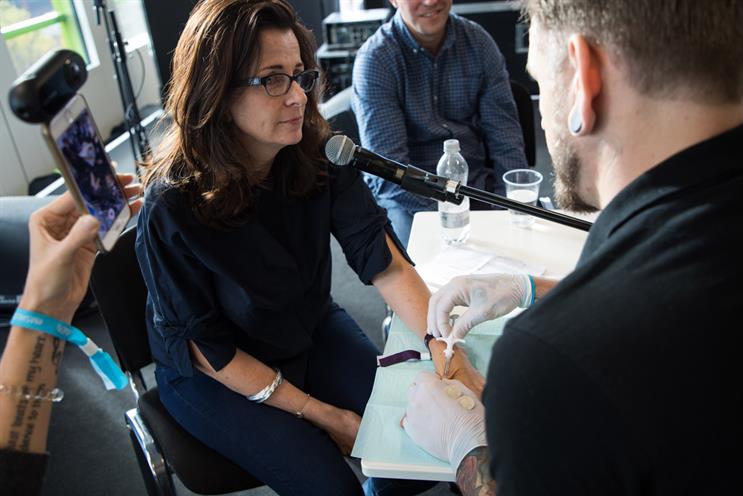Last week at Huddle, I sat on stage in front of hundreds of people and had an NFC device the size of a grain of rice injected into my hand by the guys from Biohax International.
Not your average Thursday…
As technology becomes ever more integral to us and we defer decision making to our digital assistants and quantify our lives through data I thought why not have a device embedded in my hand. At the very least, I will never have a problem accessing my building again.
As we enter a post-human world, this topic has been debated at length by the industry.
I chaired a panel at Huddle with Hugo Rifkind and Alexi Mostrous from The Times and Beth Rigby from Sky News. One of the themes we discussed was whether a robot could ever win a Pulitzer prize? The panel were in general agreement that there are certain elements of the job that can be commoditised.
But, as Beth Rigby put it: "You can commoditise the who, what, where and when of a story but not the why because it’s dependant on relationships."
Ultimately, the future for automated journalism comes down to the need for instinct versus analysis. Journalists will all agree that instinct plays a significant role in their work and the ability to identify whether something smells right.
Alexi summed it up well when he said that "Robots are nowhere near being able to behave in the way that humans deal with other humans."
A lot of the themes that emerged tended towards the dangers of where we as a human race could be headed as technology starts to take over. This was best summed up for me in a discussion by Azeem Azhar (who writes The Exponential View), who called out four key questions about whether the impact of technology on humanity will be positive or not:
- Will technology be controlled by corporations solely for profit?
- Can humans cope with the pace of change? (challenges of automation etc)
- Will we see a split in society between the Immortals (owners of the AI, augmenting themselves to live to 200) and the Useless Class (the rest of us living off UBI or being techno-serfs)
- How do we design technology to be value neutral? (issues of built-in bias in algorithms)
All of this was summed up when he speculated that the fate of horses during the age of mechanisation, is perhaps an indicator as to what might happen to humans during the upcoming intelligence revolution.
Jeffrey Cole from The Center for the Digital Future feels that the future looks less bright for humans. They are predicting that driverless cars will change the world more than any other development over the next 20 years.
His view, was that in 20-25 years we won’t let humans drive at all. However, the opportunity for advertisers looked rosier as the driverless car will become the second most important environment for consuming media after the home.
Ethical issues surrounding sex robots was tackled by Tyger Drew-Honey, the actor and TV presenter, and a panel of academics brought to Huddle by BBC Advertising.
Tyger is one of the few men to know what it’s like to have sex with a robot. Joking aside, there are challenging ethical issues that we face from the debate as to whether these robots empower paedophiles and rapists, or help with their rehabilitation, or whether the arrival of adult sex brothels signal the end of human prostitution.
This ethical debate has been discussed by other industry experts and I was comforted to hear that others believe that robots are here to serve us and not replace us. Until we understand what consciousness is then our place in society is safe.
It's evident that technology is evolving and consuming more areas of our lives at an exponential rate and as I test out the chip in my hand today and perhaps driverless cars in the next decade, a post-human world is becoming more certain and defining our new roles as a race needs to be discussed.
Helen McRae is chief executive of Mindshare UK


